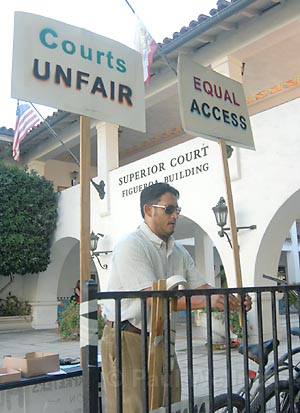
When Jose Navarrete received the call that he’d be going on strike, he prepared himself for a solitary stand outside the Santa Barbara Superior Court’s Figueroa Division. Navarrete may be a member of the California Federation of Interpreters (CFI), but he’s the only one working in the city of Santa Barbara and has thus become a one-man picket line.
Union officials had been negotiating with representatives from the San Luis Obispo, Los Angeles, and Santa Barbara county court systems in an effort to get full-time court interpreters paid on a merit-based salary schedule like all other judicial employees-five percent raises every five years, in addition to cost-of-living increases. When those talks reached a stalemate in July, however, union members were told to be ready to strike any day. “It’s symbolic, what I’m doing, but I believe what I’m doing is right,” said Navarrete, who heard news of the walkout on the evening of September 4.
Santa Barbara County’s five union court interpreters-Navarrete plus four working in Santa Maria and Lompoc-may pale in number compared to the more than 400 protesting outside Los Angeles-area courthouses, but Navarrete said he hopes the strike will draw attention to what many court interpreters are calling a matter of unfairness and disrespect. Santa Maria interpreter Doris Vick agreed. “I know when people read about the strike in the paper, they think it’s all about the money,” she said. “[However] it’s that they refuse to even consider or negotiate with us about it.”
That “it” is the scheduled salary raises, which CFI members claim would reward long-term service. Gary Blair, the Santa Barbara Superior Court’s executive officer and chief administrator, sees the math differently. He said with the four percent cost-of-living adjustment already awarded to interpreters, they would be making roughly $75,000 a year-“not a bad salary” in his estimation. Furthermore, Blair said, because the union wants to make the interpreters’ current salary the first step in the salary increase scale, those at the top of that pay scale could cost the court system around $95,000 once benefits are considered. “And we’re state-funded,” Blair noted. “So we have to depend on the state to provide that money.”
Because Santa Barbara County employs so few full-time interpreters, Blair said his courthouse has felt little impact from it. Contract workers do the bulk of translation work, with six regular contractors working in Santa Barbara and another six in North County. Santa Barbara County falls into Region One of the California Superior Court, but only Los Angeles County employs a large enough stable of interpreters for the strike to affect work. In Santa Barbara, contractors are filling in for the approximately 20 percent of adult cases and 35 percent of juvenile cases that necessitate translation. (Almost all translation in Santa Barbara County is between Spanish and English.) Whatever the resolution, however, it will be felt most strongly in Los Angeles. “We’re a minority player in the whole thing,” Blair said.
Perhaps nobody understands that better than Navarrete, whose solo protest has entered its second week. A Los Angeles native, Navarrete studied for two years at the Southern California School of Interpretation. As he explains it, court interpretation is more than the mere transformation of inocente into “not guilty.” Navarrete’s training allows him to understand how a person’s national origin can shade their perception of the American justice system. That’s in addition to familiarity with legal, criminal, and medical terminologies, as well as slang. “There are so many ways you could translate something, and the wrong one can affect how a client sees a case,” he said.
Until the strike’s resolution, Navarrete’s expertise isn’t benefiting anyone. Courts insist the union’s demands are not a realistic possibility this year. Sylvia Barden-president of CFI, which is affiliated with the Communications Workers of America-said 94 percent of union members are participating in the work action. Together, these facts may mean Navarrete and others will be waiting for some time before hearing word-in any language-that they’ll be back at work soon.



